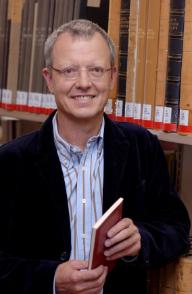EDUGLOBALFORUM2008 › Michael Schratz, Professor of Education, University of Innsbruck, Austria
Michael Schratz, Professor of Education, University of Innsbruck, Austria

Dr. Michael Schratz is Professor of Education at the University of Innsbruck, Austria, and head of the Department of Teacher Education and School Research. He was appointed Dean of the Faculty of Education on 1st January 2008.
His main interests are in educational innovation and change with a particular focus on leadership, quality development and self-evaluation. He taught in Austria and Great Britain, did research at the University of California, San Diego, and worked at Deakin University (Australia).
He has been involved in several international projects both in former Eastern countries such as Estonia, Croatia, Czech Republic, Romania, Russia and in the European Union (Evaluation expert in TSER Programmes of the European Commission and member of Steering Group in the pilot projet “Evaluating Quality in School Education” of the European Commission). He is an Austrian representative for the Expert Group on Teacher and Trainer Education in the European Union and for ENTEP (European Network of Teacher Education Policies). He is also the Austrian representative for “Developing School Leadership” of the OECD. Together with Prof. Wilfried Schley (University of Zürich) he is scientific director of the Austrian Leadership Academy.
Among his publications are books on teaching and learning, leadership and management, innovation and change, evaluation and quality assurance. His most important books are: Bildung für ein unbekanntes Morgen: Auf der Suche nach einer neuen Lernkultur (Education for an Unknown Tomorrow: In Search of a New Learning Culture) (Munich, 1991) and Teaching Teenagers: Humanistic Techniques in English Language Teaching (London, 1993, with Herbert Puchta). He edited Gehen Bildung, Ausbildung und Wissenschaft an der Lebenswelt vorbei (Munich, 1988), a collection exploring whether everyday knowledge and formal education/scientific knowledge contradict one another, and Qualitative Voices in Educational Research (London, 1993). He co-authored Schulen machen Schule (1991), a book on school autonomy and development, as well as Schule leiten und gestalten: Mit einer neuen Führungskultur in die Zukunft (Innsbruck, 1993, with Walter Fischer), a book on a new leadership culture for school development. More recent books are Research as Social Change (London 1995, with Rob Walker) and Gemeinsam Schule lebendig gestalten (Weinheim 1996), and in co-authorship: Die Lernende Schule [The Learning School] (Weinheim 1998, with Ulrike Steiner-Löffler), Qualitätsentwicklung – Verfahren, Methoden, Instrumente [Quality Development – Procedures, Methods, Instruments] (Weinheim 2000, with Manfred Iby and Edwin Radnitzky) and Self-Evaluation in European Schools: A Story of Change (London 2000, with John MacBeath, Denis Meuret, Lars Jabkobsen). In 2002 he co-edited Lehrerinnen- und Lehrerbildung braucht Qualität. Und wie!? on the quality of teacher education (with Hans Brunner, Erich Mayr and Ilsedore Wieser). Qualität sichern – Schulprogramme entwickeln [Assuring quality – developing school plans] was published in 2003. With Sibylle Rahm he co-edited LehrerInnenforschung – Theorie braucht Praxis. Braucht Praxis Theorie?, a collection of articles on practitioner research, and two volumes on Schulpädagogische Forschung (Educational Research: vol 1 on innovative approaches to research into teaching and learning, vol 2 on organisational learning research), edited with Sibylle Rahm and Ingelore Mammes in 2006. In 2007, with Christian Kraler he edited Ausbildungsqualität und Kompetenz im Lehrerberuf (Quality of pre-service teacher education and competencies in the teaching profession) and with Peter Fauser and Manfred Prenzel Was für Schulen! Gute Schulen in Deutschland, a collection of prize-winning schools in the selection process of the best schools in Germany. With Wilfried Schley he also published in 2007 Leadership: Kraft zum neuen Denken, an empowerment booklet on leadership. In 2008 he edited Wissen erwerben, Kompetenzen entwickeln (Acquiring knowledge, developing competencies) together with Christian Kraler.
Related Documents

